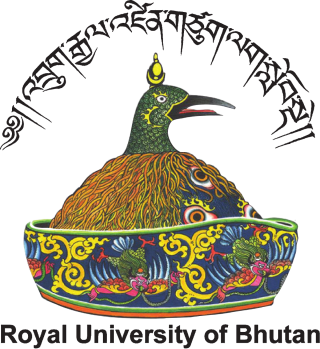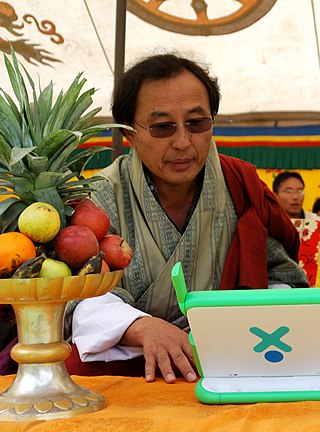Related Research Articles

Thimphu is the capital and largest city of Bhutan. It is situated in the western central part of Bhutan, and the surrounding valley is one of Bhutan's dzongkhags, the Thimphu District. The ancient capital city of Punakha was replaced by Thimphu as capital in 1955, and in 1961 Thimphu was declared as the capital of the Kingdom of Bhutan by the 3rd Druk Gyalpo Jigme Dorji Wangchuck.

"Druk Tsenden" is the national anthem of Bhutan. Adopted in 1953, the lyrics were written by Dolop Droep Namgay and possibly translated into English by Dasho Gyaldun Thinley. The accompanying music was composed by Aku Tongmi.

Jigme Singye Wangchuck is a member of the House of Wangchuck who was the king of Bhutan from 1972 until his abdication in 2006. During his reign, he advocated the use of a Gross National Happiness index to measure the well-being of citizens rather than Gross domestic product.

The national flag of Bhutan is one of the national symbols of Bhutan. The flag features a Chinese dragon from Bhutanese mythology. This alludes to the Dzongkha name of Bhutan – Druk Yul – as well as the Drukpa Lineage of Tibetan Buddhism, which is the dominant religion of Bhutan.

Jigme Dorji Wangchuck was the 3rd Druk Gyalpo of Bhutan.

The Royal University of Bhutan, founded on June 2, 2003, by a royal decree, is the national university of Bhutan. It is the first and the oldest university in Bhutan.

Gross National Happiness, sometimes called Gross Domestic Happiness (GDH), is a philosophy that guides the government of Bhutan. It includes an index which is used to measure the collective happiness and well-being of a population. Gross National Happiness Index is instituted as the goal of the government of Bhutan in the Constitution of Bhutan, enacted on 18 July 2008.
Articles related to Bhutan include:

LyonpoSangay Ngedup was Prime Minister of Bhutan from 1999 to 2000 and again from 2005 to 2006.

Rinpung Dzong, sometimes referred to as Paro Dzong, is a large dzong - Buddhist monastery and fortress - of the Drukpa Lineage of the Kagyu school in Paro District, Bhutan. It houses the district Monastic Body as well as government administrative offices of Paro Dzongkhag. It is listed as a tentative site in Bhutan's Tentative List for UNESCO inclusion.

Dasho Kinley Dorji was Bhutan's first trained journalist who became founder, then managing director and editor in chief of Kuensel, Bhutan's national newspaper. In 2009 he became Secretary of the Ministry of Information and Communications, a position he held until 2016.

Tourism in Bhutan began in 1974, when the Government of Bhutan, in an effort to raise revenue and to promote Bhutanese unique culture and traditions to the outside world, opened its isolated country to foreigners. In 1974 a total of 287 tourists visited the Kingdom of Bhutan. The number of tourists visiting Bhutan increased to 2,850 in 1992, and rose dramatically to 7,158 in 1999. By the late 1980s tourism contributed over US$2 million in annual revenue.
Pema Dorji was a Bhutanese doctor (drungtsho) of traditional Bhutanese and Tibetan medicine, was the first person to institutionalize traditional medicine in Bhutan. He was the founding director of the National Indigenous Medicine Hospital and of the Institute of Indigenous Medicine in the capital Thimphu, and the key person behind the establishment of the Health Department's indigenous clinics and dispensaries in all 20 districts of Bhutan which make available free treatment and medicine to all the citizens of Bhutan.
Although for many decades, it was customary to focus on GDP and other measures of national income, there has been growing interest in developing broad measures of economic well-being. National and international approaches include the Beyond GDP programme developed by the European Union, the Better Lives Compendium of Indicators developed by the OECD, as well as many alternative metrics of wellbeing or happiness. One of the earliest attempts to develop such an index at national level was Bhutan's Gross National Happiness Index and there are a now a number of similar projects ongoing around the world, including a project to develop for the UK an assessment of national well-being, commissioned by the Prime Minister David Cameron and led by the Office for National Statistics.
Med Jones is an American economist. He is the president of International Institute of Management, a U.S. based research organization. His work at the institute focuses on economic, investment, and business strategies.
Gross National Well-being/Wellness (GNW) or Happiness (GNH) a socioeconomic development and measurement framework. The GNW/GNH Index consists of seven dimensions: economic, environmental, physical, mental, work, social, and political. Most wellness areas include both subjective results and objective data.
Dorji Yangki is one of the first female architects from Bhutan.

The Bhutan Centre for Media and Democracy (BCMD) is the first Civil Society Organisation in Bhutan. It was launched in 2008 coinciding with the country's first government elections, which heralded a new era of self-governance following the abdication of the fourth king of Bhutan, Jigme Singye Wangchuck. At the same time, the media landscape saw the arrival of new private newspapers and radio stations, as well as social media via mobile telephones and the Internet. The stated mission of BCMD is to "nurture democracy in Bhutan through civic engagement, public discourse and media literate citizens".
Dasho Karma Ura is the President of the Centre for Bhutan Studies and Gross National Happiness Research. He is also an active scholar, writer, painter and historian.
LyonphoThakur Singh Powdyel is a Bhutanese politician and educator of Nepali descent. He served as Minister of Education from 2008 to 2013, overseeing the Green Schools program as a part of the implementation of Gross National Happiness in Bhutan. He is currently the president of Royal Thimphu College.